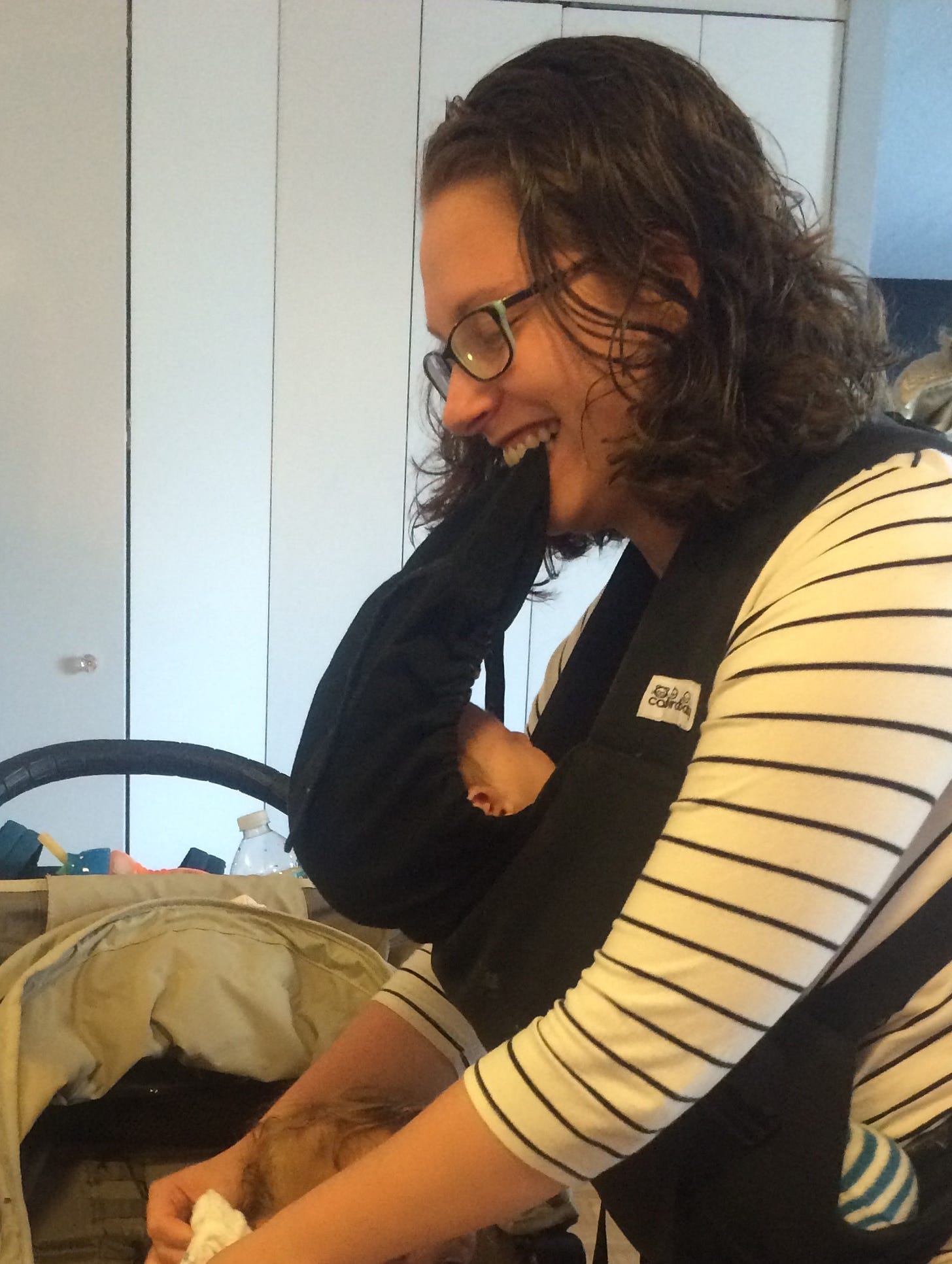The Case for Having Your First Two Kids Back-to-Back
You’re not drowning, you’re learning to swim
When our first two kids were born just 17 months apart, we didn’t do it because we were gluttons for punishment. We did it because—even while caring for a baby—I still had baby fever. So we leaned in. And suddenly, there we were: two babies, one slightly larger than the other, trying to figure out how to be a family of four before we’d really figured out how to be three.
Our first photos together are pure chaos: a baby holding a baby, eyes wide, limbs flailing, everyone in motion. And I wouldn’t trade it for anything.
My cousin took that photo above. I was wearing a newborn, putting a sweater on my toddler. My hands were full, and I was using my teeth to hold the hood of the baby carrier upright.
Now, ten years later, I’m sitting on a park bench watching my kids play, overhearing two parents with a toddler who is, evidently, their only child. The conversation sounds familiar, because it’s the kind of conversation we never had time to have.
Should they have packed sandals or closed-toe shoes? Is she safe walking from the mulch to the grass? Did she have enough protein with her snack?
They’re completely consumed by her. Every detail. Every move. Every step under microscopic review.
And I get it. When you have one child and all your time is theirs, you can’t help but spiral into obsessive caregiving. But having two kids close together short-circuits that in a really good way. It forces a kind of detachment—not out of neglect, but necessity. You can’t overthink everything when you’re triaging. And as it turns out, a little less thinking might be exactly what today’s parents need.
That constant overanalysis of modern parenting? It’s a trap. A miserable, paralyzing trap. We convince ourselves that if we can just optimize every moment—every mealtime, nap, playground outing—we’ll produce a perfect child. But perfection isn’t possible. What kids actually need is a sane, stable parent who isn’t spiraling about footwear choices.
Having two kids back-to-back helped free me from that mindset early on. I didn’t have time to narrate every step or reevaluate every snack. I had a baby on my hip and a toddler in the sandbox. I was doing my best to keep everyone clean-ish, fed-ish, safe-ish, and happy-ish. And that was more than enough.
That frenetic first year with two tiny ones wasn’t easy, but it was clarifying. I learned to let go of the unnecessary. I learned that kids don’t need curated experiences—they need space to explore and parents who trust them to figure things out. I learned that “good enough” parenting really is good enough.
And despite all the warnings I got when visibly pregnant with #2—“You’ll never sleep again!” “Are you crazy?” —I now look back and see that the decision set the tone for the rest of our parenting journey. Those early days of chaos created a calm later on. I parent differently because of that experience. I’m not easily rattled. I don’t panic over small things. I know what real chaos feels like—and most of what parents today call “stress” doesn’t even register on the scale.
What people don’t realize is that the second time around, you’re not starting from zero. You already know how to change diapers and soothe a crying baby. You’ve already figured out how to load a diaper bag and survive a sleepless night. You’re not reinventing the wheel—you’re just adding another passenger. And while the logistics get trickier, the mental load can actually lighten.
The best part? The bond. When your kids are close in age, they do life together. They share toys, interests, and experiences. They’re built-in companions. Sure, they fight. But they also conspire, play, and problem-solve together in ways that only siblings close in age can. You’re not just building a family—you’re building a unit.
So yes, the beginning is hard. But everything meaningful is. And the payoff is lasting.
If you’re in that moment right now—tired, overwhelmed, juggling bottles and potty training and feeling like you’re barely holding it together—know this: you’re not failing. You’re forging something strong. You’re laying a foundation not just for your kids, but for yourself. A foundation that says, “I can do hard things, and I don’t need to overthink every detail to be a good parent.”
Back then, I felt like I was drowning. But now I realize I was learning to swim.
And I’m grateful every day that I jumped in when I did.



